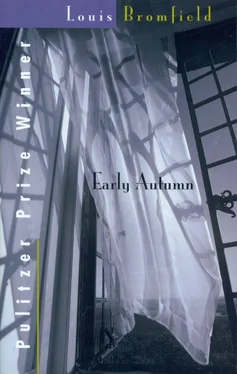She thought again, “I am a little mad tonight. What has come over me?” And she grew frightened, though it was a different sort of terror from that which afflicted her at the odd moments when she felt all about her the presence of the dead who lived on and on at Pentlands. What she knew now was no terror of the dead; it was rather a terror of warm, passionate life. She thought, “This is what must have happened to the others. This is how they must have felt before they died.”
It was not physical death that she meant, but a death somehow of the soul, a death which left behind it such withered people as Aunt Cassie and Anson, the old woman in the north wing, and even a man so rugged and powerful as John Pentland, who had struggled so much more fiercely than the others. And she got a sudden sense of being caught between two dark, struggling forces in fierce combat. It was confused and vague, yet it made her feel suddenly ill in a physical sense. The warm feeling of life and excitement flowed away, leaving her chilled and relaxed, weary all at once, and filled with a soft lassitude, still looking out into the night, still smelling the thick odor of cattle and haw-thorn blossoms.
She never knew whether or not she had fallen asleep in the bergére by the window, but she did know that she was roused abruptly by the sound of footsteps. Outside the door of her room, in the long hallway, there was someone walking, gently, cautiously. It was not this time merely the creaking of the old house; it was the sound of footfalls, regular, measured, inevitable, those of some person of almost no weight at all. She listened, and slowly, cautiously, almost as if the person were blind and groping his way in the darkness, the step advanced until presently it came opposite her and thin slivers of light outlined the door that led into the hall. Quietly she rose and, still lost in a vague sense of moving in a nightmare, she went over to the door and opened it. Far down the long hall, at the door which opened into the stairway leading to the attic of the house, there was a small circle of light cast by an electric torch. It threw into a black silhouette the figure of an old woman with white hair whom Olivia recognized at once. It was the old woman escaped from the north wing. While she stood watching her, the figure, fumbling at the door, opened it and disappeared quickly into the stairway.
There was no time to be lost, not time even to go in search of the starched Miss Egan. The poor creature might fling herself from the upper windows. So, without stopping even to throw a dressing gown about her, Olivia went quickly along the dark hall and up the stairway where the fantastic creature in the flowered wrapper had vanished.
The attic was an enormous, unfinished room that covered the whole of the house, a vast cavern of a place, empty save for a few old trunks and pieces of broken furniture. The flotsam and jetsam of Pentland life had been stowed away there, lost and forgotten in the depths of the big room, for more than a century. No one entered it. Since Sybil and Jack had grown, it remained half-forgotten. They had played there on rainy days as small children, and before them Sabine and Anson had played in the same dark, mysterious corners among broken old trunks and sofas and chairs.
Olivia found the place in darkness save for the patches of blue light where the luminous night came in at the double row of dormer windows, and at the far end, by a group of old trunks, the circle of light from the torch that moved this way and that, as if old Mrs. Pentland were searching for something. In the haste of her escape and flight, her thin white hair had come undone and fell about her shoulders. A sickly smell of medicine hung about her.
Olivia touched her gently and said, “What have you lost, Mrs. Pentland? Can I help you?”
The old woman turned and, throwing the light of the torch full into Olivia’s face, stared at her with the round blue eyes, murmuring, “Oh, it’s you, Olivia. Then it’s all right. Perhaps you can help me.”
“What was it you lost? We might look for it in the morning.”
“I’ve forgotten what it was now. You startled me, and you know my poor brain isn’t very good, at best. It never has been since I married.” Sharply she looked at Olivia. “It didn’t affect you that way, did it? You don’t ever drift away and feel yourself growing dimmer and dimmer, do you? It’s odd. Perhaps it’s different with your husband.”
Olivia saw that the old woman was having one of those isolated moments of clarity and reason which were more horrible than her insanity because for a time she made you see that, after all, she was like yourself, human and capable of thought. To Olivia these moments were almost as if she witnessed the rising of the dead.
“No,” said Olivia. “Perhaps if we went to bed now, you’d remember in the morning.”
Old Mrs. Pentland shook her head violently. “No, no, I must find them now. It may be all different in the morning and I won’t know anything and that Irish woman won’t let me out. Say over the names of a few things like prunes, prisms, persimmons. That’s what Mr. Dickens used to have his children do when he couldn’t think of a word.”
“Let me have the light,” said Olivia; “perhaps I can find what it is you want.”
With the meekness of a child, the old woman gave her the electric torch and Olivia, turning it this way and that, among the trunks and old rubbish, made a mock search among the doll houses and the toy dishes left scattered in the corner of the attic where the children had played house for the last time.
While she searched, the old woman kept up a running comment, half to herself: “It’s something I wanted to find very much. It’ll make a great difference here in the lives of all of us. I thought I might find Sabine here to help me. She was here yesterday morning, playing with Anson. It rained all day and they couldn’t go out. I hid it here yesterday when I came up to see them.”
Olivia again attempted wheedling.
“It’s late now, Mrs. Pentland. We ought both to be in bed. You try to remember what it is you want, and in the morning I’ll come up and find it for you.”
For a moment the old woman considered this, and at last she said, “You wouldn’t give it to me if you found it. I’m sure you wouldn’t. You’re too afraid of them all.”
“I promise you I will. You can trust me, can’t you?”
“Yes, yes, you’re the only one who doesn’t treat me as if I wasn’t quite bright. Yes, I think I can trust you.” Another thought occurred to her abruptly. “But I wouldn’t remember again. I might forget. Besides, I don’t think Miss Egan would let me.”
Olivia took one of the thin old hands in hers and said, as if she were talking to a little child, “I know what we’ll do. Tomorrow you write it out on a bit of paper and then I’ll find it and bring it to you.”
“I’m sure little Sabine could find it,” said the old woman. “She’s very good at such things. She’s such a clever child.”
“I’ll go over and fetch Sabine to have her help me.”
The old woman looked at her sharply. “You’ll promise that?” she asked. “You’ll promise?”
“Of course, surely.”
“Because all the others are always deceiving me.”
And then quite gently she allowed herself to be led across the moonlit patches of the dusty floor, down the stairs and back to her room. In the hall of the north wing they came suddenly upon the starched Miss Egan, all her starch rather melted and subdued now, her red face purple with alarm.
“I’ve been looking for her everywhere, Mrs. Pentland,” she told Olivia. “I don’t know how she escaped. She was asleep when I left. I went down to the kitchen for her orange juice, and while I was gone she disappeared.”
Читать дальше












